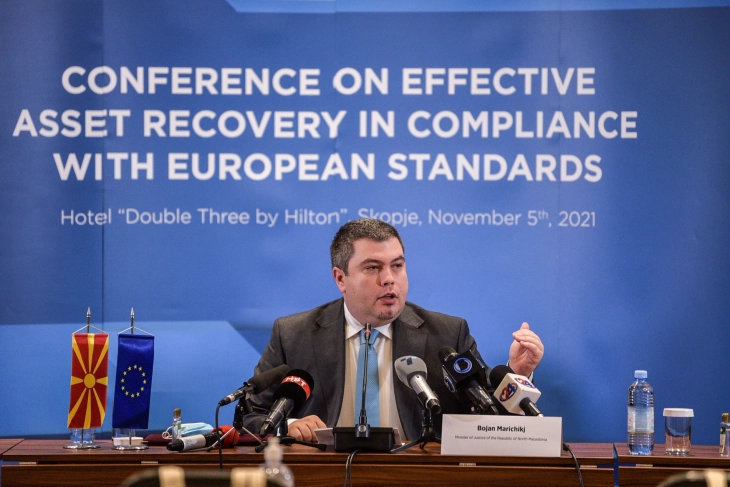Minister Marichikj: Necessary balance in law on origin of assets to be provided

Skopje, 5 November 2021 (MIA) – Confiscation of illegally acquired assets has been high on the agenda recently in North Macedonia, where there have been high corruption cases with verdicts related to confiscation that is difficult to implement in practice, but at the same time a law on the origin of assets is in the works, Justice Minister Bojan Marichikj told Friday a joint news conference alongside European Court of Human Rights (ECHR) President Róbert Spanó and Biljana Braithwaite, Director of the AIRE Center’s Western Balkans program.
The news conference was held after a regional conference on effective asset recovery in compliance with European standards, organized in Skopje by AIRE Center Western Balkans and the Justice Ministry.
“It is important to keep the balance between the public interest of confiscating illegal assets and to protect the right to ownership, a right protected under the Constitution and the convention,” he said.
It’s no easy balance, Marichikj stressed. “We’ll provide the necessary balance in the law on the origin of assets in the legislation because we don’t want to adopt a law that is against the convention,” the Minister said.
The law on the origin of assets, Minister Marichikj added, is yet another instrument to improve the confiscation dossier and aims to accelerate the process. Under the law, any assets for which the origin cannot be determined all the while exceeding a certain threshold and for which taxes haven’t been paid, should be confiscated by the state in an accelerated proceedings.
“These instruments will be regulated under an amended law and I hope the amendments will be passed in the coming period because they are crucial in the fight against corruption,” Marichikj told the news conference.
In September in Strasbourg, Minister Marichikj on behalf of the government signed Protocol No. 16 to the Convention for the Protection of Human Rights and Fundamental Freedoms. According to him, the protocol should increase the level of communication and dialogue between the national courts and the ECHR all the while ensuring better access to justice. It is expected under the protocol, the number of applications lodged to the ECHR from North Macedonia to drop.
Protocol No. 16 enables the highest national courts and tribunals to request the ECHR to give advisory opinions on questions of principle relating to the interpretation or application of the rights and freedoms defined in the Convention or the Protocols. North Macedonia is to designate which courts will be in charge, but it is expected that to be the appellate courts in addition to the Constitutional Court.
“It will cut down the time to get a response in relation to years-long proceedings and it is expected to cut the number of applications to the ECHR because it will accelerate the process to get an opinion on certain matters,” Minister Marichikj said.
ECHR President Robert Spano said that Protocol No. 16 when enforced in the country will establish a strengthened dialogue between the Strasbourg-based court and national courts.
Speaking at the news conference, he urged dialogue to resume and awareness to be strengthened since the national courts will be in charge of protecting and guaranteeing human rights of the people in the country.
Spano stressed that Council of Europe member countries should stick to the principles of democracy, fairness, justice and equality and to fight against corruption in their countries.
Referring to the Skopje conference, Spano said it is an important contribution to creating awareness about the need from systemic and strong strategies in the countries that had signed the convention.
The topic of today’s conference is key in the long fight against corruption and organized crime, according to Braithwaite of the AIRE Center’s Western Balkans program.
Asset recovery is restoring trust in the institutions and it is one of the most important aspects in rule of law, she stressed.
“As a result, in 2018 with the Secretariat of the Regional Anti-Corruption Initiative we decided to strengthen the capacities of the relevant institutions. In the next three years as part of the second stage of the project, we will continue to alleviate dialogue between regional professionals in the sphere and to offer support to sign agreement in order to develop a standardized statistical analysis model as regards recovered assets,” Braithwaite said.







